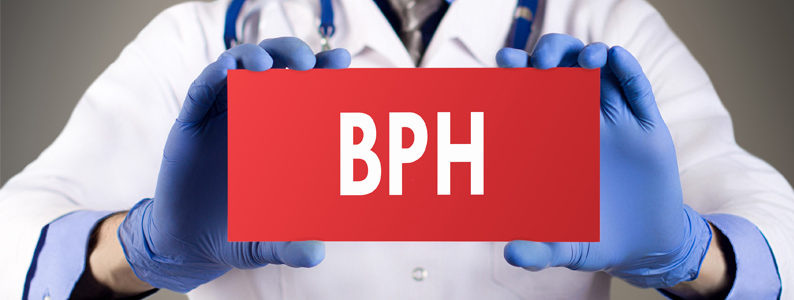
About half of all men age 50 and over will face a common diagnosis: benign prostatic hyperplasia. BPH, as it is known, is the most widespread cause of prostate enlargement. As men grow older, the likelihood of BPH increases—by age 70, as many as 90 percent will develop it. In fact, experts in the field believe if a man lives long enough, he’s almost guaranteed to experience BPH regardless of his ethnicity or background.
When dealing with BPH, the most important word to note is benign. BPH is not a prostate cancer diagnosis (although a patient can experience BPH and prostate cancer at the same time). Rather, BPH refers to a growth of the prostate gland that causes the urethra to tighten and squeeze.
As a result, symptoms can include:
- Marked increased frequency in urination
- A slower urine stream
- Difficulty emptying the bladder completely
These symptoms can lead to both physical and emotional discomfort. Additionally, since it often means frequent bathroom trips during the night, BHP can lead to fatigue and exhaustion.
Treatment Options
There are many effective options worth pursuing that can improve the symptoms of BPH, such as lifestyle changes, medication and surgery.
Lifestyle Changes
Reducing tension through a regular regimen of yoga, exercise or meditation can relieve stress and may reduce the need to urinate quite as frequently. Similarly, Kegel exercises, which strengthen the muscles around the bladder, can help with bladder control. Taking time during urination to ensure complete voiding of the bladder by waiting a few moments then trying again is another useful tool.
It is also advised to avoid decongestants like Sudafed® or Benadryl®, which can inhibit urination, as well as certain prescription drugs that are used to treat high blood pressure or depression. A doctor can advise on these issues.
Finally, a diet that promotes prostate health can prove beneficial. This type of diet includes fruits, vegetables, whole grains, beans, nuts, seeds and fish that contain omega-3 fatty acids (e.g. salmon, tuna).
Medication
Doctors will usually prescribe alpha blockers, which relax the muscle at the base of the prostate and bladder, and 5-alpha-reductase inhibitors, which can, over time, shrink the prostate.
The downside: Side effects of these medications sometimes include increased blood pressure for alpha blockers and sexual dysfunction for the 5-alpha-reductase inhibitors (although that can be treated with erectile dysfunction medication).
Surgery
If neither lifestyle nor pharmaceutical remedies have worked, UroLift® is the next solution. UroLIft is a minimally invasive procedure that relieves pressure on the urethra by inserting implants that permanently separate the lobes of the prostate. There is little downtime for this treatment, which can be performed in the office or as a same-day procedure in an ambulatory surgery center.
Some patients might not be a candidate for UroLift. For those individuals, other options include:
- A transurethral resection, in which a medical instrument is inserted into the urethra to unblock it.
- Laser surgery, which eliminates tissue that’s tightening the flow.
With either of these procedures, recovery requires a day or two in the hospital, followed by a few weeks of gradual healing. Relief from symptoms should subside with the effects of surgery lasting up to 15 years.
It is important to note that although conservative methods are always recommended as a first line of defense, surgery is fairly common for this condition. In fact, about 200,000 men undergo surgeries for BPH every year.
Consulting the BPH Specialists
You don’t have to manage BPH alone. If you’re experiencing symptoms, our team is here to help you find the right treatment plan and guide you through it.
Our seasoned group of board certified urologists has been treating diseases of the genitourinary organs for over 25 years. These include the kidneys, ureters, bladder, prostate and testicles. Our mission is to treat you with the utmost care and respect while navigating you through your urologic concerns.
For more information or to schedule an appointment, please contact Partners In Urology.

